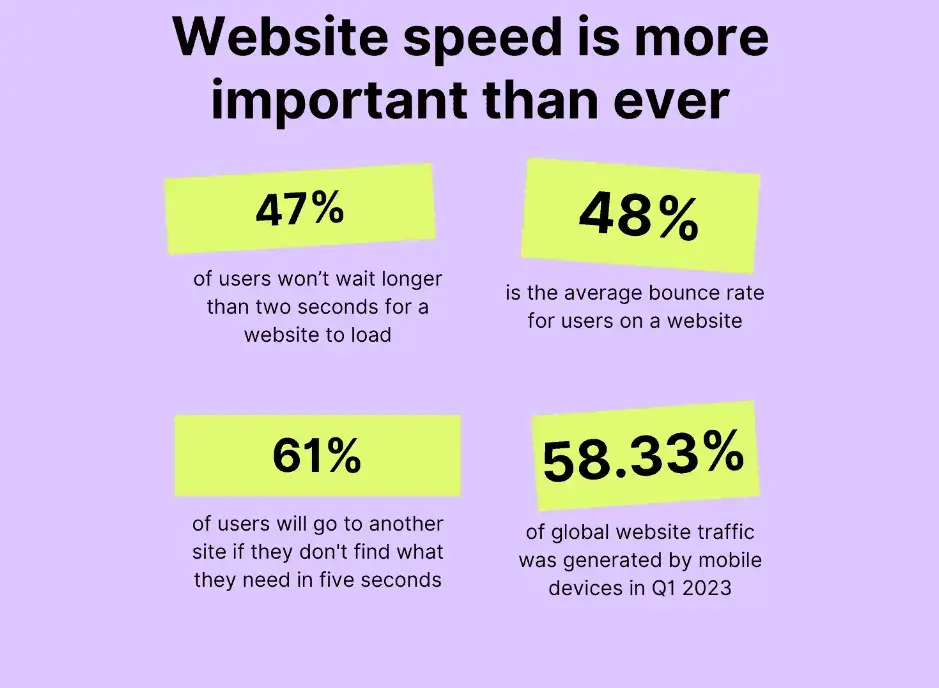To succeed with your business online, you need to prioritize a fast and reliable website.
You might have the best products on the market, but you need a website that keeps your customers engaged to convert them into paying customers.
You might be surprised that one of the most crucial elements in having a website that provides a great user experience (UX) is all about your web hosting.
47% of users will not wait more than two seconds for a website to load before they click away.

Source: Hosting Advice
So, if your website is loading slowly, you could immediately lose nearly half of all traffic that comes to your site.
Since web hosting is the most critical factor in your overall website speed, it shows you just how key your decision about hosting is.
For e-commerce sites, choosing a high-quality hosting provider with expertise in uptime, security, and scalability is crucial to the business's long-term success.
This article will explore key hosting factors that impact user experience, including site speed, responsiveness, backup resilience, and 24/7 expert support.
Selecting the right web host might be the most crucial decision for your website, so you must be completely informed.
Top UX Factors to Consider When Selecting a Web Host
- Uptime and reliability
- Site speed and performance
- Hosting affects your scalability
- Strong hosting = strong security
- The importance of support
- Backups and recovery
Uptime and reliability
When it comes to the best possible UX, you need to emphasize consistent uptime.
It might sound simple, but some cheaper web hosting providers need to improve at peak times, which can make it difficult for users to get on your website.
If customers can't reach your site when they want to, they aren't going to wait around for you - they'll be immediately off to find a competitor.
Worse still, Google and other search engines prefer to see websites with limited downtime.
So not only will a lousy hosting provider be providing a negative experience to customers who try to visit your site, but they will also be actively hampering your ability to draw in new clients.
Look for a managed hosting provider that can offer you consistent uptime and one that will be there for you when problems occur.
20i explains managed hosting as “giving you the power of cloud hosting but without the extra work. You don’t have to manage the server, install all the software, and keep it updated.
With Managed Hosting, this is all done for you. If you have any problems, support is on hand to help.”
Site speed and performance
Speed is a defining characteristic of positive UX.
The performance of your website has a significant impact on multiple areas of customer engagement and your conversion rates - so if your website performs well, you can look forward to a boost in sales.
Fast page loading speed is also considered a key factor in Google's search rankings.
It is principally because faster page load speeds tend to improve measurable goals such as readership, visitor satisfaction, and search engine visibility.

Users expect pages to load within 2-3 seconds at maximum, so choosing a web host with ample server resources, a global CDN network, caching layers, and performance optimization expertise is vital to delivering fast page response times.
And if you invest in this website speed, it shows customers your respect for their time.
With web performance directly tied to revenue, a fast site pays dividends through higher conversion rates and customer retention.
Hosting affects your scalability
E-commerce sites require a web host capable of seamlessly scaling resources to accommodate traffic spikes driven by promotions, new product releases, or seasonal sales events.
Cloud hosting can allow you to expand server capacity and bandwidth as site traffic comes and goes.

With the cloud, resources can scale up or down automatically based on demand - dedicated servers offer stable performance but lack scalability—plan host capacity around projected traffic surges and future growth.
An adaptable infrastructure ensures excellent performance even during peak sales periods.
Scalability shows customers you can reliably handle their purchases despite sudden spikes in traffic volume.
Strong hosting = strong security
Robust security is imperative for safeguarding customers and e-commerce transactions.
Web hosts should provide layers of defense, including:
- Firewall protection
- Server hardening
- Patched software
- DDoS mitigation
Conduct regular security risk assessments and penetration testing to identify and address vulnerabilities.
Follow security best practices like enforcing strong passwords, multi-factor authentication for admin access, and SSL encryption across the site.

The host should monitor the site 24/7 and provide immediate notification of threats.
Security boosts customer trust that their data is protected from external attacks and unauthorized access.
Investing in security sends the message you take your responsibility to safeguard user data seriously.
Security combined with vigilant monitoring helps maintain the integrity customers expect.
The importance of support
Reliable web hosting hinges on responsive, expert support from the provider.
Leading hosts offer 24/7 live customer support via phone, live chat, and ticketing systems.
It enables issues to be reported and addressed at any time of day.
Prioritize hosts with fast response times under 30 seconds for direct inquiries.
Evaluate whether support reps demonstrate sufficient technical knowledge to troubleshoot effectively.
Lacking quick support creates delays that degrade the user experience.
Additionally, implementing log monitoring can provide insights into the root causes of support delays, allowing for proactive identification and resolution of technical issues, thus improving overall user satisfaction.
Responsive assistance provides confidence that any performance hiccups or security concerns will be swiftly handled.
Support response time and expertise reflect a host's commitment to customer satisfaction.
Backups and recovery
Data protection is intrinsic to user experience - without backups, data loss can disrupt e-commerce operations.
Choose a web host that performs automatic daily backups and facilitates regular test restores to verify recoverability.
Backups should be stored in geographically dispersed locations to enable disaster recovery.
Offsite replication prevents data loss if the primary hosting site is impacted.
Users have peace of mind knowing their transaction and account data is securely backed up and restorable.
Data backup, restoration, and site recovery capabilities demonstrate the host's readiness to minimize downtime in the event of hardware failure, data loss, or disaster.
Conclusion
Hopefully this guide has provided you with a clear framework for choosing a suitable web host for your online business.
From site speed and responsiveness to backup resilience and 24/7 expert support, selecting the right web hosting platform will ensure long-term success for your business and provide an excellent user experience with your brand online.

